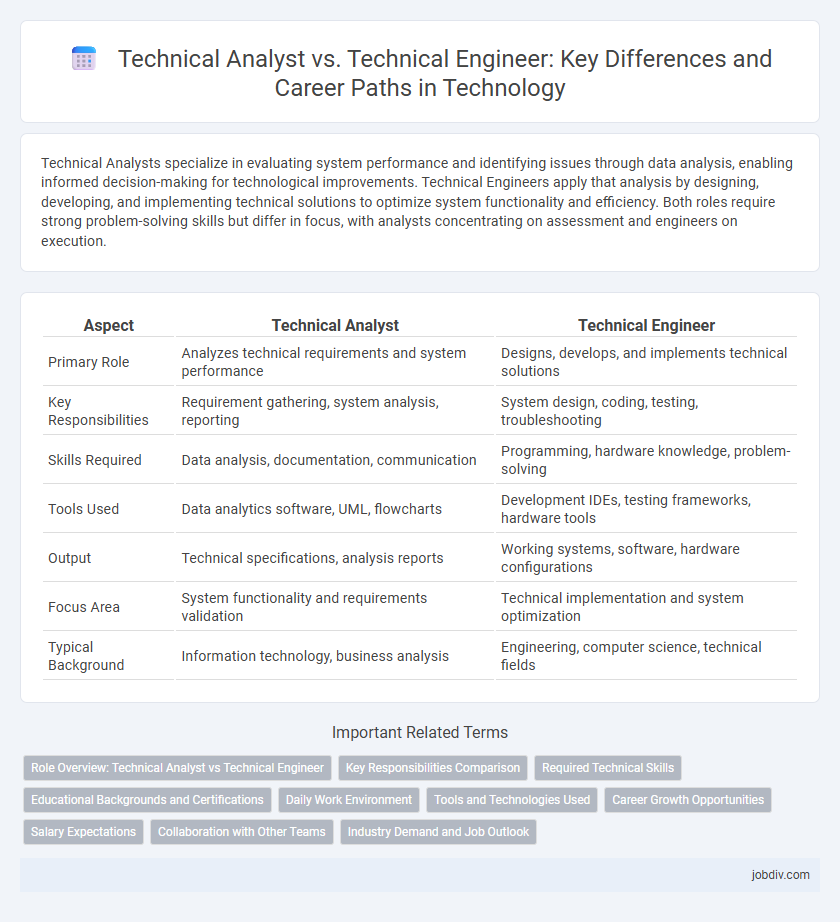Technical Analysts specialize in evaluating system performance and identifying issues through data analysis, enabling informed decision-making for technological improvements. Technical Engineers apply that analysis by designing, developing, and implementing technical solutions to optimize system functionality and efficiency. Both roles require strong problem-solving skills but differ in focus, with analysts concentrating on assessment and engineers on execution.
Table of Comparison
| Aspect | Technical Analyst | Technical Engineer |
|---|---|---|
| Primary Role | Analyzes technical requirements and system performance | Designs, develops, and implements technical solutions |
| Key Responsibilities | Requirement gathering, system analysis, reporting | System design, coding, testing, troubleshooting |
| Skills Required | Data analysis, documentation, communication | Programming, hardware knowledge, problem-solving |
| Tools Used | Data analytics software, UML, flowcharts | Development IDEs, testing frameworks, hardware tools |
| Output | Technical specifications, analysis reports | Working systems, software, hardware configurations |
| Focus Area | System functionality and requirements validation | Technical implementation and system optimization |
| Typical Background | Information technology, business analysis | Engineering, computer science, technical fields |
Role Overview: Technical Analyst vs Technical Engineer
Technical Analysts specialize in assessing system performance, identifying issues, and recommending improvements based on data-driven evaluations. Technical Engineers focus on designing, implementing, and maintaining technical infrastructure, ensuring system functionality aligns with specified requirements. Both roles complement each other by combining analytical insights with hands-on engineering expertise to optimize technology solutions.
Key Responsibilities Comparison
A Technical Analyst primarily focuses on analyzing system requirements, identifying technical issues, and recommending improvements to optimize business processes. Key responsibilities include gathering and interpreting technical data, troubleshooting software or hardware problems, and liaising between stakeholders and development teams to ensure solutions align with business goals. In contrast, a Technical Engineer is responsible for designing, developing, implementing, and maintaining technical infrastructure and systems, ensuring hardware and software components operate efficiently and securely.
Required Technical Skills
Technical Analysts require proficiency in data analysis tools, statistical software, and expertise in interpreting complex system requirements to optimize performance. Technical Engineers need strong skills in hardware design, network configuration, programming languages, and system integration to implement and maintain technical solutions effectively. Mastery of diagnostic tools and troubleshooting methodologies is crucial for both roles but varies in application depending on their focus within IT infrastructure or software development.
Educational Backgrounds and Certifications
Technical Analysts typically possess educational backgrounds in computer science, information technology, or data analytics, often complemented by certifications such as Certified Business Analysis Professional (CBAP) or PMI Professional in Business Analysis (PMI-PBA). Technical Engineers usually hold degrees in engineering disciplines like electrical, mechanical, or software engineering, with professional certifications including Cisco Certified Network Associate (CCNA) or Microsoft Certified: Azure Solutions Architect Expert. Both roles benefit from continuous education, but Analysts focus more on business and data-oriented qualifications, while Engineers emphasize technical and system design credentials.
Daily Work Environment
Technical Analysts primarily focus on interpreting data and monitoring system performance through tools like SQL and network analyzers, enabling informed decision-making in dynamic environments. Technical Engineers engage in hands-on problem-solving, deploying, maintaining, and optimizing hardware and software systems using scripting languages and configuration management tools. Both roles collaborate closely with IT teams, but Analysts emphasize data-driven insights while Engineers prioritize system architecture and implementation.
Tools and Technologies Used
Technical Analysts primarily utilize data analytics tools such as SQL, Python, and specialized software like Tableau and Power BI to interpret and visualize system performance metrics. Technical Engineers focus on hardware and software engineering tools, including CAD software, embedded system platforms, and programming languages like C++ and Java for system development and troubleshooting. Both roles leverage version control systems like Git and collaborate using platforms such as JIRA and Confluence to ensure seamless project execution.
Career Growth Opportunities
Technical Analysts specialize in data interpretation and system performance evaluation, providing insights that drive strategic decisions and process improvements. Technical Engineers focus on designing, developing, and maintaining hardware or software systems, with career growth often leading to senior engineering or project management roles. Both career paths offer advancement opportunities, but Technical Engineers typically experience broader roles in system architecture and leadership within technology development.
Salary Expectations
Technical Analysts typically earn between $65,000 and $85,000 annually, depending on experience and industry, while Technical Engineers report higher salary expectations ranging from $75,000 to $110,000. The salary gap reflects the Technical Engineer's deeper involvement in system design, development, and implementation compared to the Analytical role focused on data interpretation and reporting. Geographic location and specialized skills, such as proficiency in specific programming languages or engineering certifications, also significantly influence compensation levels in both professions.
Collaboration with Other Teams
Technical Analysts and Technical Engineers collaborate closely with cross-functional teams to ensure seamless project execution and problem resolution. Technical Analysts translate business requirements into technical specifications, facilitating clear communication between stakeholders and engineers. Technical Engineers leverage this collaboration to design, develop, and implement solutions that align with business goals and technical feasibility.
Industry Demand and Job Outlook
Technical Analysts, specializing in data interpretation and market trends, experience growing demand in sectors like finance and IT, driven by the need for informed business decisions. Technical Engineers, focused on system design and implementation, remain crucial in manufacturing, telecommunications, and technology development, where innovation and infrastructure upgrades are priorities. Job outlooks for both roles indicate steady growth, with analysts benefiting from digital transformation and engineers from advancements in automation and smart technologies.
Technical Analyst vs Technical Engineer Infographic

 jobdiv.com
jobdiv.com